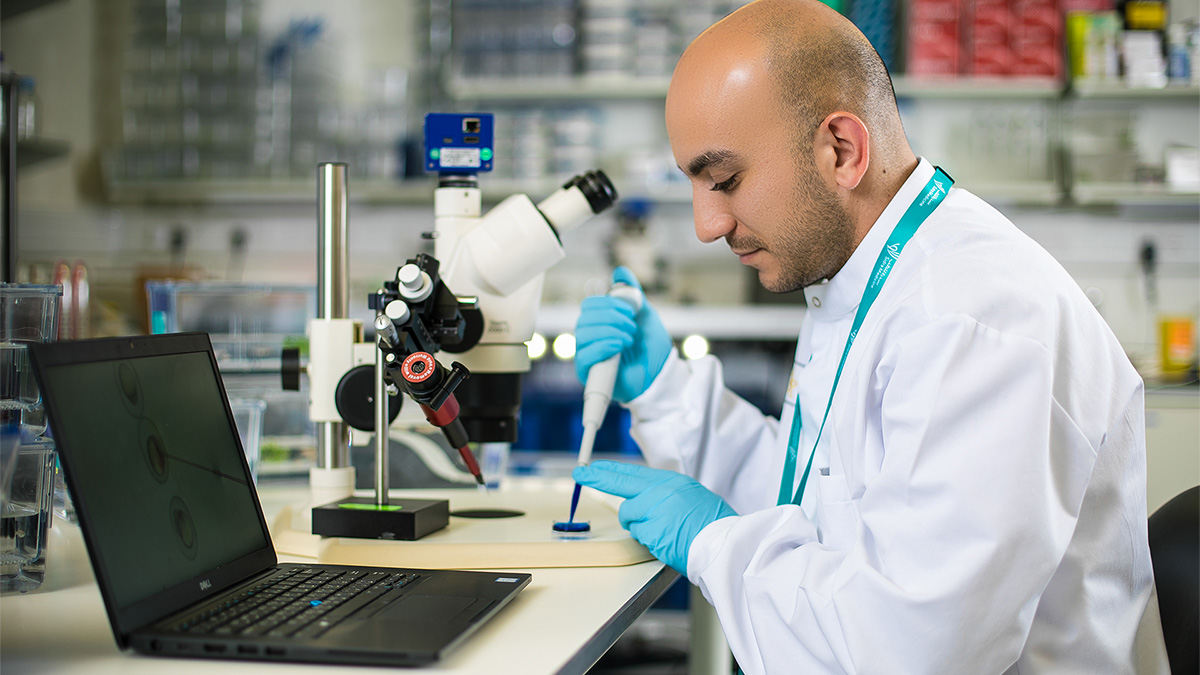QF Entity study can aid in vaccine design and development of antiviral antibody therapies
Doha, Qatar – A team of researchers from Sidra Medicine have published a study about antibody responses against ‘common cold’ coronaviruses involving over a thousand individuals. The study is featured in the February 22 issue of JCI Insight, a peer-reviewed medical journal.
Dr. Nico Marr, principal investigator and group leader who led the study at Sidra Medicine, explained: “Antibodies play a crucial part in our body’s defense against infectious diseases, such as COVID-19. Antibodies travel through our blood and other bodily fluids. They can efficiently recognize and neutralize microbes that invade our body. The sites they recognize are called ‘epitopes’, which represent only around seven* of normally several hundred building blocks that make up a microbial protein. It is important to realize that which epitopes they bind is very crucial, as this determines their function and role during the course of infection. By studying antibodies against the four ‘common cold’ coronaviruses that frequently infect humans, we were hoping to shed light on immunity towards human coronaviruses in general.”

Using state-of-the-art technology, the research team at Sidra Medicine were able to find out in each subject if they had anti-coronavirus antibodies and where they bound to the coronavirus particle. This helped find important differences between children and adults.
“When we took a closer look at the antibodies in children, we found frequently antibodies that bind to exactly the parts of the viral proteins that are very important for the virus to enter our cells and cause disease. We know from other studies that antibodies are not always beneficial. In some cases, antibodies cause neither harm nor benefits to the body if they target the wrong part of the virus. In other instances, antibodies can even enhance disease by accelerating viral infection or by hindering components of our immune system,” continued Dr. Marr.
Another finding from the study was that some antibodies, particularly those found in children, had properties allowing them to bind to proteins of the more virulent coronaviruses that can cause SARS and MERS. Scientists refer to this property of the antibodies as ‘cross-reactivity’. This may help explain why children experience less severe symptoms when they become infected with MERS coronavirus or SARS-CoV-2.
Dr. Taushif Khan, a postdoctoral fellow at Sidra Medicine and first author of the study, explained: “Thorough knowledge about where antibodies target the viral proteins from the different coronaviruses can be helpful for vaccine design and the development of antiviral antibody therapies. It can potentially also help us understand the likelihood and effects of mutations in specific locations of the viral genome giving rise to new variants of SARS-CoV-2, which has already occurred and will inevitably continue to occur in the future.”
“Antibody binding sites that are similar across different coronaviruses suggest that the locations won’t change as quickly. This is because the virus particles need certain sites to interact with proteins of its human host in order to multiply in numbers, whereas other parts of the viral proteins can handle mutations more easily. In other words, these insights can help us find the Achilles’ heel of coronaviruses, to be better prepared for new variants of currently circulating strains and even newly emerging coronaviruses,” continued Dr. Khan.
Dr. Khalid Fakhro, Chief Research Officer at Sidra Medicine said: “This study is a clear demonstration of how research platforms and technologies enable investigation of virus-host biology at such high resolution, and offer solutions and insights related to the current pandemic as well as other coronaviruses more generally. As an academic medical center, Sidra Medicine is committed to research at the interface of clinical care as part of our ongoing Precision Medicine Program, that will not only help patients in Qatar in the short-term, but will also have a global impact in the long-term.”


